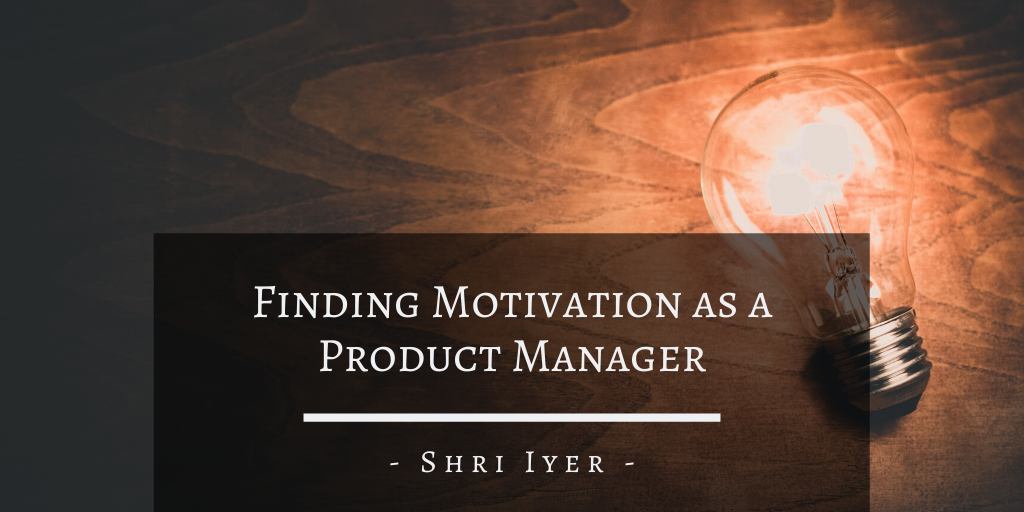Why did you become a Product Manager? Perhaps you’re a jack of all trades—you’re creative, a problem-solver, a people-person, a cheerleader and beacon of positivity. Or, maybe you’re a natural leader who craves responsibility and strategic opportunities. There may even be a third reason, something far more personal and specific.
No matter what brought you into the product world, that drive is at odds with a common professional issue—finding motivation. What is it that brings Product Managers into the profession, and what keeps them there? This motivation can come in many forms, including the nature of the job! While certain factors may dissuade someone going into Product Management, the same elements can be a huge draw for others in the world of product!

Embracing Unpredictability
Some professionals would be content to do the same tasks every day, every week, every month for years on end. However, Product Managers typically don’t want any status quo; they embrace change and chaos as drivers of innovation and creativity. Product Management is all about finding unique solutions that provide value to customers. Without change, streamlining products and services isn’t possible.
While roadmaps intend on keeping PMs and teams on the straight-and-narrow, the charted course is never set in stone. Just think about how many alternate routes a traveler can take on a road trip to reach a given destination. If a team veers off in a different direction, it’s not the end of the world. Instead, it’s up to the Product Manager to take the wheel and maneuver everyone back onto the road (even if it means taking the scenic route!).
Keep in mind that a roadmap should be clear in its direction. If a team’s roadmap is cluttered, finding the right path can be nearly impossible. The roadmap represents that perfect scenario, where every piece falls into place, and variables cause no negative impacts on a project. The roadmap is the product vision—it changes alongside the vision, but should serve as a polished guide nonetheless. A clear roadmap enables PMs to embrace unpredictability from day one. It gives Product Managers an excuse to relish in unique challenges, so don’t be afraid of the tricky situations you’re bound to encounter!

Creating Value
As Domain Product Director Julian Connor writes, “Product Managers should live and die by their ability to deliver results.” Those results, Julian emphasizes, must be meaningful. They must have value, not just for the company, but for the buyers and end-users of a product. Failure to create value is another motivator, pushing Product Managers to find the critical value proposition of their product. What sets this product apart? Why should customers embrace your creation?
Creating that value is a complex process that involves managing several teams and addressing the wants and needs of customers. In his article on Product Manager motivations, ProductPlan Founder and Chief Strategist Jim Semick emphasizes the importance of “delighting customers.” Product Managers, he says, should have “a customer-centric mindset,” as this leads to success in developing creative and useful solutions. After all, happy customers are loyal customers, and word-of-mouth advertising is a powerful means of onboarding new users.

To be genuinely successful, Product Managers must understand their own motivations and their customers’ motivations. This understanding will help PMs work with marketing and sales teams to craft meaningful, enticing campaigns. An understanding of psychology adds another layer of depth to a PM’s skillset!
Being a Team Player and Ring Leader
Look at any list of top traits for Product Managers, and “team player” will undoubtedly be one of the headings.
Product School CEO Carlos Gonzalez de Villaumbrosia writes that one of the most significant motivating factors for Product Managers is “being at the heart of a business and product.” PMs play a central role in the production and distribution of products, using a roadmap to illustrate the best course of action for everyone involved.
Beyond aligning teams to the product vision, PMs also must align the products and themselves to the company’s values. Everything is interconnected in this sense, and by building a network of like-minded stakeholders, PMs can better understand what makes their products unique.
It’s not just about being part of a team, though—PMs are conductors of the product symphony, and the job requires the ability to wrangle and lead various folks. As Carey Caulfield, Principal Product Manager at LogMeIn illustrates, “The product manager sets the tone for a product, understands the customer’s pain points, leads a team, takes various forms of input, and ultimately makes the product-related decisions.” Being successful and motivated as a PM requires the balance of teamwork and leadership. If someone can practice both of those, they have plenty of potential as a Product Manager.
Problem-Solving
Despite all of the technical expertise that Product Managers adopt over the course of their careers, creativity is the most useful skill for problem-solving. To once again quote Carey Caulfield, Product Managers “aren’t complainers but doers, makers, fixers and dreamers, envisioning a better or new way.”

Still, that’s not to say PMs should dive headlong into the first solution that comes their way. No, PMs are tinkerers and thinkers—toying around with options to find the best-fit solutions and approaching each problem with refined strategy. Challenges and problems should urge PMs forward on the path to success! After all, innovation can come from some of the more creative solutions to problems. If a PM wants to make the best product for their target demographic, creativity and problem-solving must go hand-in-hand.
With all of the moving parts involved in product development and distribution, it’s easy to lose sight of what matters. However, recognizing and appreciating those driving factors is as valuable to a Product Manager as the product itself. By staying motivated, PMs can remain authentic, confident, and as hard-working as ever.

